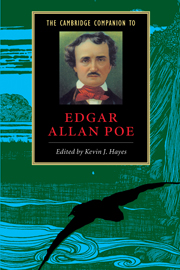Book contents
- Frontmatter
- Introduction
- 1 The poet as critic
- 2 Poe and his circle
- 3 Poe’s aesthetic theory
- 4 Poe’s humor
- 5 Poe and the Gothic tradition
- 6 Poe, sensationalism, and slavery
- 7 Extra! Extra! Poe invents science fiction!
- 8 Poe’s Dupin and the power of detection
- 9 Poe’s feminine ideal
- 10 A confused beginning
- 11 Poe’s “constructiveness” and “The Fall of the House of Usher”
- 12 Two verse masterworks
- 13 Poe and popular culture
- 14 One-man modernist
- Select bibliography
- Index
6 - Poe, sensationalism, and slavery
Published online by Cambridge University Press: 28 May 2006
- Frontmatter
- Introduction
- 1 The poet as critic
- 2 Poe and his circle
- 3 Poe’s aesthetic theory
- 4 Poe’s humor
- 5 Poe and the Gothic tradition
- 6 Poe, sensationalism, and slavery
- 7 Extra! Extra! Poe invents science fiction!
- 8 Poe’s Dupin and the power of detection
- 9 Poe’s feminine ideal
- 10 A confused beginning
- 11 Poe’s “constructiveness” and “The Fall of the House of Usher”
- 12 Two verse masterworks
- 13 Poe and popular culture
- 14 One-man modernist
- Select bibliography
- Index
Summary
Defending “Berenice,” in a letter to Thomas White, Poe confesses that the tale's “subject is by far too horrible” yet asserts that the “history of all Magazines shows plainly that those which have attained celebrity were indebted for it to articles similar in nature - to Berenice.” This nature consists of “the ludicrous heightened into the grotesque: the fearful coloured into the horrible: the witty exaggerated into the burlesque: the singular wrought out into the strange and mystical.” Poe justifies such work: to “be appreciated you must be read, and these things are invariably sought after with avidity.” While Poe couches his economic interest within assertions about originality and careful style and also by noting that “some very high names valued themselves principally upon this species of literature,” he concludes the letter by stating that the marketplace rather than the critic is the final arbiter: “The effect - if any -” he writes, “will be estimated better by the circulation of the Magazine than by any comments upon its contents.” Elevating economic success over good taste, Poe demonstrates early in his career his desire to master the literary marketplace and his awareness that manipulating its conventions offered the key to such mastery.
- Type
- Chapter
- Information
- The Cambridge Companion to Edgar Allan Poe , pp. 92 - 112Publisher: Cambridge University PressPrint publication year: 2002

